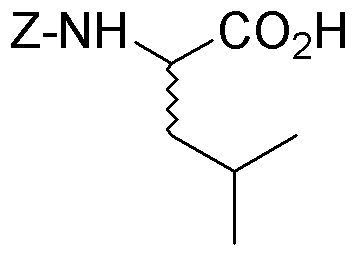Z-DL-leucine (oil) is widely utilized in research focused on:
- Pharmaceutical Development: This compound is important in the synthesis of various pharmaceuticals, particularly in formulations aimed at enhancing protein synthesis and muscle recovery.
- Food Industry: Used as a dietary supplement, it helps in promoting muscle growth and recovery, making it popular among athletes and fitness enthusiasts.
- Biochemical Research: It serves as a building block in peptide synthesis, aiding researchers in studying protein interactions and functions.
- Cosmetic Formulations: Its properties are leveraged in skincare products for its moisturizing effects, benefiting formulations aimed at improving skin health.
- Animal Nutrition: Often included in feed formulations to enhance growth and improve overall health in livestock, contributing to more efficient farming practices.
General Information
Properties
Safety and Regulations
Applications
Z-DL-leucine (oil) is widely utilized in research focused on:
- Pharmaceutical Development: This compound is important in the synthesis of various pharmaceuticals, particularly in formulations aimed at enhancing protein synthesis and muscle recovery.
- Food Industry: Used as a dietary supplement, it helps in promoting muscle growth and recovery, making it popular among athletes and fitness enthusiasts.
- Biochemical Research: It serves as a building block in peptide synthesis, aiding researchers in studying protein interactions and functions.
- Cosmetic Formulations: Its properties are leveraged in skincare products for its moisturizing effects, benefiting formulations aimed at improving skin health.
- Animal Nutrition: Often included in feed formulations to enhance growth and improve overall health in livestock, contributing to more efficient farming practices.
Documents
Safety Data Sheets (SDS)
The SDS provides comprehensive safety information on handling, storage, and disposal of the product.
Product Specification (PS)
The PS provides a comprehensive breakdown of the product’s properties, including chemical composition, physical state, purity, and storage requirements. It also details acceptable quality ranges and the product's intended applications.
Certificates of Analysis (COA)
Search for Certificates of Analysis (COA) by entering the products Lot Number. Lot and Batch Numbers can be found on a product’s label following the words ‘Lot’ or ‘Batch’.
Numéro de catalogue
Numéro de lot/série
Certificates Of Origin (COO)
This COO confirms the country where the product was manufactured, and also details the materials and components used in it and whether it is derived from natural, synthetic, or other specific sources. This certificate may be required for customs, trade, and regulatory compliance.
Numéro de catalogue
Numéro de lot/série
Safety Data Sheets (SDS)
The SDS provides comprehensive safety information on handling, storage, and disposal of the product.
DownloadProduct Specification (PS)
The PS provides a comprehensive breakdown of the product’s properties, including chemical composition, physical state, purity, and storage requirements. It also details acceptable quality ranges and the product's intended applications.
DownloadCertificates of Analysis (COA)
Search for Certificates of Analysis (COA) by entering the products Lot Number. Lot and Batch Numbers can be found on a product’s label following the words ‘Lot’ or ‘Batch’.
Numéro de catalogue
Numéro de lot/série
Certificates Of Origin (COO)
This COO confirms the country where the product was manufactured, and also details the materials and components used in it and whether it is derived from natural, synthetic, or other specific sources. This certificate may be required for customs, trade, and regulatory compliance.


